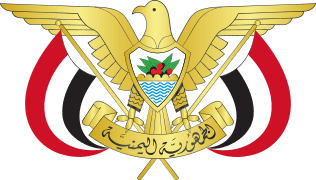House of Representatives (Yemen)
The House of Representatives (Majlis al-Nuwaab) is the lower house of the Parliament of Yemen. It shares the legislative power with the Shura Council, the upper house.[2][3] The Assembly of Representatives has 301 members, elected for a six-year term in single-seat constituencies.
House of Representatives مجلس النواب اليمني | |
|---|---|
 | |
| Type | |
| Type | Lower house of the Parliament of Yemen |
| History | |
| Founded | 1990 |
| Leadership | |
| Structure | |
| Seats | 301 |
_as_of_April_2020.svg.png) | |
Political groups | General People's Congress (170) Yemeni Congregation for Reform (44) |
| Committees | Unknown |
Joint committees | Unknown |
| Elections | |
| First-past-the-post | |
Last election | April 27, 2003 |
| Website | |
 |
|---|
| This article is part of a series on the politics and government of Yemen |
|
|
|
Executive |
|
Legislature
|
| Judiciary |
|
|
|
The House of Representatives was established in 1990 after the unification of Yemen for a transitional period.[4] An election hasn't been held for the body since 2003. An election was set for 27 April 2009, but president Saleh postponed it by two years on 24 February 2009.[5][6] However, the election did not take place on 27 April 2011, and was again postponed until the next presidential election, sometime in February 2014.[7][8] In January 2014, the final session of the National Dialogue Conference (NDC) announced that both elections had been delayed, and would occur within 9 months of a referendum on a new constitution which had yet to be drafted.[9] However both the GPC and Houthi representatives on the National Authority for Monitoring the Implementation of NDC Outcomes have refused to vote on the new constitution drafted by the constitution drafting committee, which submitted it in January 2015.[10]
In February 2015, the Houthis briefly dissolved parliament before reportedly agreeing to reinstate the 301-member assembly in UN-brokered talks. Under the agreement, it will be augmented by a "people's transitional council" serving as the upper house.[11]
Since the civil war, the House of Representatives had held semi-regular sessions in San'aa in Houthi-held territory. In April 2019, the first session was held in Seiyun, in Hadi-controlled Hadhramaut Governorate.[12]
Latest elections
The last parliamentary election in Yemen took place in 2003.
| Parties | Votes | % | Seats | |
|---|---|---|---|---|
| General People's Congress (al-Mu'tammar al-Sha'bi al-'Am) | 3,429,888 | 58.0 | 238 | |
| Yemeni Congregation for Reform (al-Tajmu al-Yamani li al-Islah) | 1,333,394 | 22.6 | 46 | |
| Yemen Socialist Party (Hizb al-Ishtirakiya al-Yamaniya) | 277,223 | 3.8 | 8 | |
| Nasserite Unionist People's Organisation (al-Tantheem al-Wahdawi al-Sha'bi al-Nasseri) | 109,480 | 1.9 | 3 | |
| Arab Socialist Ba'ath Party (Hizb al Baath al'Arabi al Ishtiraki) | 40,377 | 0.7 | 2 | |
| National Arab Socialist Ba'ath Party (Hizb Al-Ba'ath Al-Arabi Al-Ishtiraki Al-Qawmi) | 23,745 | 0.4 | 0 | |
| Nasserite Popular Correctional Movement (al-Tashih al-Shabi al-Nasiri) | 15,257 | 0.25 | 0 | |
| Yemeni Union of Popular Forces (Ittihad al-Qiwa al-Shabiyya) | 11,967 | 0.2 | 0 | |
| Democratic Nasserite Party (al-Hizb al-Dimuqrati al-Nasiri) | 9,829 | 0.16 | 0 | |
| Democratic National Front (al-Jabha al-Wataniya al-Dimuqratiyya) | 7,056 | 0.12 | 0 | |
| Social Nationalist Party (Hizb al-Qawmi al-Ijtimai) | 5,349 | 0.09 | 0 | |
| al-Haqq Party (Hizb al-Haqq) | 4,585 | 0.08 | 0 | |
| People's Democratic Party (Hizb al-Shab al-Dimuqrati) | 4,077 | 0.07 | 0 | |
| Democratic Union of Popular Forces (al-Ittihad al-Dimuqrati) | 3,003 | 0.05 | 0 | |
| Social Green Party (Hizb al-Khudr al-Ijtimai) | 2,276 | 0.04 | 0 | |
| Popular Unity Party (Hizb al-Wahda al-Shabiyya) | 1,739 | 0.03 | 0 | |
| Yemeni League Party (Al Rabita al-Yamaniyya al-Shariyya) | 1,383 | 0.02 | 0 | |
| Liberation Front Party (Hizb Jabhat al-Tahrir) | 1,282 | 0.02 | 0 | |
| Popular Unionist Liberation Party (Hizb al-Tahrir al-Shabi al-Wahdawi) | 1,241 | 0.02 | 0 | |
| Yemeni Unionist Gathering (al-Tajammu al-Wahdawi al-Yamani) | 483 | 0.01 | 0 | |
| Democratic September Organization (al-Tanzim al-Sebtembri) | 81 | 0.001 | 0 | |
| Non-partisans | - | . | 4 | |
| Total (turnout 76.0%) | 5,912,302 | 100.0 | 301 | |
| Source: electionguide.org. A number of candidates elected as non-partisans joined MSA or Islah. Other sources give a different division of seats. Also list of results and parties here and here. | ||||
References
- https://debriefer.net/en/news-7825.html
- "Constitutional history of Yemen". ConstitutionNet. Retrieved 26 June 2019.
- "Yemen". Freedom House. Retrieved 26 June 2019.
- http://yemenparliament.gov.ye/Details?Post=40
- Stephen Day (2009-06-02). "Yemen Postpones Its April 2009 Parliamentary Elections". Middle East Institute. Retrieved 2015-04-04.
- Parliament Overwhelmingly Approves Proposal To Extend Term- Yemen Post English Newspaper Online. Yemenpost.net. Retrieved on 2010-11-08.
- "September 2012 Monthly Forecast – Yemen". Security Council Report. 2012-08-31.
- "Foreign Secretary welcomes Yemeni plan for elections in 2014" (Press release). Foreign & Commonwealth Office, UK. 7 March 2013. Retrieved 7 July 2013.
- "Yemen's 'national dialogue' ends in violence, no election scheduled". Archived from the original on 2015-01-21. Retrieved 2016-01-05.
- "Houthis and GPC refuse to vote on constitution". Archived from the original on 2018-07-08. Retrieved 2016-01-05.
- "Yemen feuding parties agree on transitional council". Al Jazeera. 20 February 2015. Retrieved 19 February 2015.
- https://debriefer.net/en/news-7825.html
See also
- List of Speakers of the Assembly of Representatives of Yemen
- Politics of Yemen
- List of legislatures by country